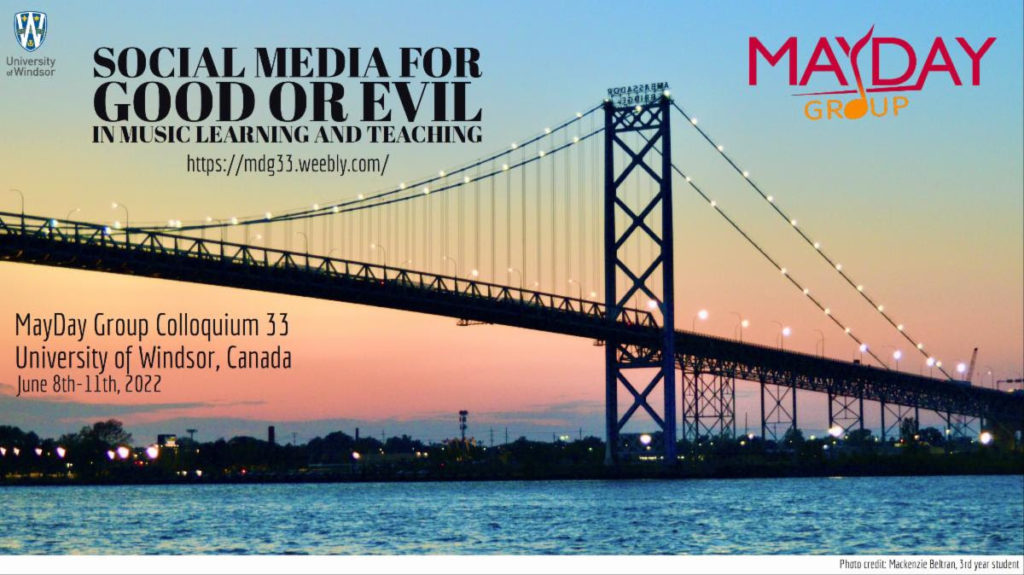
The MayDay Group is extending the deadline for MayDay Group Colloquium 33: Social Media for Good or Evil in Music Learning and Teaching at University of Windsor, Canada, to Monday, January 31st, 2022. We hope to see you there! The MayDay Group invites scholars, music makers, educators, and innovators from around the globe to submit proposals to this year’s colloquium centered on the following action ideal: TECHNOLOGY AND DIGITAL MEDIA We critically examine ways in which humans and technologies interact, and how these interactions contribute to the development and/or destruction of forms of musical knowledge and practice. Technologies evolve within socio-cultural contexts as responses to shifting needs and modes of encounters among humans and their surrounding environments. The use of technologies alters the very ways in which we interact, communicate, and make meaning of our world—transforming individual and collective perceptions of knowledge, truth, and justice. Yet, surrounding the creation, introduction, manipulation, and use of each technological tool is an ideological bias with the potential to induce benefits and harms. Implementation of existing and emergent technologies must be balanced with ongoing critique of the commodification of musics, teaching, and learning; inequitable distribution of and access to technological resources; and concerns about corporate power and overreach. It is hard to imagine modern life and all aspects of music making, learning, and teaching without technology and digital media. As a field, music education has a long history of drawing extensively on literature from other disciplines—most notably philosophy, sociology, psychology, and education—but critical scholarly work from the fields of social/digital media and communications, and the implications that body of work has for music education, has, by and large, been overlooked by music education scholars. Because the use of technologies and social media use are intersectional in both scope and nature, proposals are invited to address and/or problematize their relationship to/with music learning, teaching, making, production, and consumption. Topics may include (but are not limited to): critical theories of social media, activism, policy, identity formation, curriculum development, gender, feminist theories, class, formal institutions, community music, participatory culture, social music learning theories, and “world musics.” Priority will be given to proposals that connect critical scholarship from the fields of social media and communications with the Action Ideal on Technology and Digital Media. Inspired by the recent publication of the Oxford Handbook on Social Media and Music Learning (edited by Janice Waldron, Stephanie Horsley, and Kari Veblen), presenters may want to consider the following questions as they craft their proposals:
Presenters are encouraged to address issues and events by taking an interdisciplinary, theoretical, or philosophical approach in their analyses of trends and perceived problems, speaking as much to the wider university community and the public as to our own specialty, and to recommend Action Plans that can broaden our thinking and support a more inclusive, socially aware and informed practice of teaching and learning music in an increasingly pluralistic and diverse world community and classroom.
COLLOQUIUM FORMAT Presentations—better understood at MayDay Colloquia as provocations—are designed to stimulate discussion and debate. Therefore, each presenter will be allocated 45 minutes, to include no more than 25 minutes for the presentation and no fewer than 20 minutes for discussion. Proposals that go outside the conventional scope of a provocation are encouraged. Musical engagements will also be considered. Projectors, speakers, and screens will be available, but it is completely acceptable to use no supporting technology. Presenters must register and are expected to be in attendance at the colloquium. Extenuating circumstances to in-person presentations will be considered on a case-by-case basis. Please contact the colloquium coordinator if accommodations are needed due to political or health related issues.
PROPOSAL SUBMISSION PROCESS • Please submit both: a proposal of no more than 800 words (references included in word count) and an abstract of no more than 100 words as word.doc email attachments. Incomplete submissions will not be considered. • State your name, institutional affiliation, email address, and other contact information in the body of the email only. There should be no identifiers on proposals or abstracts. • Submit no later than January 17, 2022 January 31, 2022 to maydaygroup33@gmail.com • Proposals will be blind reviewed and evaluated according to the following criteria: clarity of ideas, contribution to/interest for the profession, relevance and contribution to theory, and connection to the action ideal and surrounding questions. • Notification will occur by email no later than February 28, 2022 March 14, 2022. • If accepted, the primary presenter and any co-presenters must register for the conference no later than March 14, 2022 April 1, 2022 or forfeit their acceptance. • Registration information will be posted on the MDG 33 Colloquium website. • Accepted abstracts will be posted to the Colloquium website by April 1, 2022 April 15, 2022 and cannot be changed after that date. |
